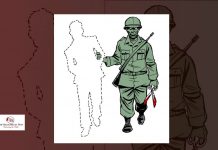By Haasil Baloch
Pakistan, since the beginning of its military invasion and occupation of Balochistan, has employed a range of strategies aimed at suppressing Baloch resistance and manipulating public narratives. The colonizing state has effectively analyzed the Baloch psyche and adapted its tactics accordingly, focusing on two main fronts: Baloch genocide and narrative building.
It is important to recognize that Pakistanization and Islamization have been key aspects of the narrative-building process. To achieve this, the Pakistani state has implemented various policies tailored to its specific objectives.
On one hand, Pakistan is constructing narratives that include concepts such as provincial autonomy, foreign agents, Indian proxies, and portraying the Baloch national struggle as the actions of a few individuals. It is also presented as an issue centered around ‘three Sardars’ in conflict with the federal government, and is unfairly labeled as being anti-development and anti-progress for Balochistan. Additionally, false allegations of receiving foreign funding and the creation of terms like ‘Naraaz Baloch’ (disgruntled Baloch) are part of this narrative. On the other hand, Pakistan has resorted to imprisoning Baloch leaders, carrying out enforced disappearances, implementing a policy of extrajudicial killings and dumping of bodies, deploying death squads throughout Balochistan, engaging in targeted killings, exploiting Balochistan’s natural resources, and even constructing mass graves after subjecting Baloch men, women, and children to brutal torture and humiliation.
In other words, we can say that the state is employing a dual strategy of using soft power and violence. This can be referred to as the ‘Water and Fire’ or ‘Smile and Blood’ politics of Pakistan concerning the Baloch people. To counter these policies, we must unite as a nation and resist them using all available means of struggle, including political resistance, armed resistance, cultural resistance, and economic resistance.
Furthermore, it is crucial to understand the tactics employed against us in the present circumstances. Pakistan is swiftly abducting Baloch youth, including students from every corner of Balochistan, and subjecting them to fake encounters, thereby mentally torturing their families in an attempt to silence them and create an atmosphere of fear among the Baloch masses, discouraging them from engaging in genuine Baloch politics. Concurrently, Pakistan is spreading negative rumors and propaganda against the Baloch liberation movement, claiming that there is no unified ‘national movement’ but rather an internal civil war within the Baloch community. They also aim to create discord and confusion by suggesting that the Baloch are not united.
As an example, Pakistan recently presented Gulzar Imam (who was arrested) before the media as a mouthpiece of the state, promoting the narrative that “armed struggle is not the solution.” However, during the same period, the Pakistan army carried out bloody operations in Bolan and adjacent areas for three consecutive days.
All these tactics are part of a deliberate effort to spread rumors and negative propaganda against the Baloch movement, aiming to undermine the support and unity of the Baloch people while generating confusion and chaos.
It is important to note that if there were indeed internal divisions within the national struggle, why would Pakistan continue its military operations in various parts of Balochistan on an almost daily basis, targeting Baloch freedom fighters? If competing groups already exist, why would Pakistan, currently facing a severe economic crisis, allocate significant resources to suppress Baloch resistance? Furthermore, if there were no national resistance, why would Pakistan resort to fake encounters, forced disappearances of Baloch youth, and even targeting Baloch women?
Pakistan is also attempting to diminish the significance of student organizations and mass parties, dismissing rallies and protests as insignificant. If that were the case, why is BSO-Azad prevented from conducting political activities openly in Balochistan? Why are BNM and FBM not allowed to engage in politics or hold public gatherings? We must deeply reflect on these matters as a whole in order to find answers to our questions and concerns.
A new policy of Pakistan involves abducting activists associated with the freedom movement and releasing them with the intention of discouraging their involvement in the independence movement, rather than resorting to the public display of their mutilated bodies. This newly adopted policy must be recognized by individuals affiliated with parties and organizations striving for freedom.
Disclaimer: The views and opinions expressed in this article are those of the author and do not necessarily reflect the official policy or position of The Balochistan Post or any of its editors.






























